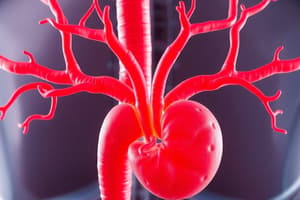Podcast
Questions and Answers
Which system do the endocrine glands and hormone-secreting organs form?
Which system do the endocrine glands and hormone-secreting organs form?
- Nervous system
- Digestive system
- Circulatory system
- Endocrine system (correct)
Where do endocrine glands secrete hormones?
Where do endocrine glands secrete hormones?
- Directly into the bloodstream (correct)
- Into the digestive system
- Into the nervous system
- Into the lymphatic system
What are the cells that hormones act upon called?
What are the cells that hormones act upon called?
- Secretory cells
- Target cells (correct)
- Receptor cells
- Messenger cells
What is the main difference between steroid and non-steroid hormones?
What is the main difference between steroid and non-steroid hormones?
What is the function of steroid hormones?
What is the function of steroid hormones?
What is the function of non-steroid hormones?
What is the function of non-steroid hormones?
What do hormones act as when homeostasis is disrupted?
What do hormones act as when homeostasis is disrupted?
What do hormones assist in maintaining?
What do hormones assist in maintaining?
What is the role of hormones in the body?
What is the role of hormones in the body?
What is the primary function of the endocrine system?
What is the primary function of the endocrine system?
Which class of hormone can readily diffuse across the phospholipid bilayer of the target cell?
Which class of hormone can readily diffuse across the phospholipid bilayer of the target cell?
What are hormones responsible for when homeostasis is disrupted?
What are hormones responsible for when homeostasis is disrupted?
Where do steroid hormones bind to their specific receptors?
Where do steroid hormones bind to their specific receptors?
What do non-steroid hormones bind to on target cells?
What do non-steroid hormones bind to on target cells?
What is the role of cAMP in non-steroid hormone action?
What is the role of cAMP in non-steroid hormone action?
How do non-steroid hormones affect target cells?
How do non-steroid hormones affect target cells?
Where do endocrine glands release hormones?
Where do endocrine glands release hormones?
What ensures that hormones are not overproduced or underproduced?
What ensures that hormones are not overproduced or underproduced?
Which gland secretes releasing and inhibiting factors into a portal system of capillaries?
Which gland secretes releasing and inhibiting factors into a portal system of capillaries?
Where is oxytocin normally produced and released?
Where is oxytocin normally produced and released?
What is the role of antidiuretic hormone (ADH)?
What is the role of antidiuretic hormone (ADH)?
What do steroid hormones do after binding to their specific receptors?
What do steroid hormones do after binding to their specific receptors?
Where are the receptors for non-steroid hormones located?
Where are the receptors for non-steroid hormones located?
What is the role of the endocrine system?
What is the role of the endocrine system?
Flashcards are hidden until you start studying
Study Notes
Endocrine System Overview
- The endocrine glands and hormone-secreting organs form the endocrine system.
- Hormones are secreted directly into the bloodstream by endocrine glands.
- Target cells that hormones act upon are known as target cells.
Hormone Types
- Steroid hormones are lipid-soluble and can readily diffuse across the phospholipid bilayer of target cells.
- Non-steroid hormones are water-soluble and cannot easily cross cell membranes.
Functions of Hormones
- Steroid hormones primarily regulate gene expression and influence metabolism and immune responses.
- Non-steroid hormones generally act as signaling molecules, triggering responses via second messengers or signaling pathways.
Homeostasis and Hormonal Response
- When homeostasis is disrupted, hormones act as regulators to restore balance.
- Hormones assist in maintaining homeostasis through feedback mechanisms.
- The primary function of the endocrine system is to coordinate and regulate various bodily functions through hormone release.
Mechanism of Action
- Steroid hormones bind to specific receptors located within the cytoplasm or nucleus of target cells.
- Non-steroid hormones bind to receptors embedded in the cell membrane of target cells.
Role of cAMP
- cAMP functions as a secondary messenger for non-steroid hormone action, amplifying the hormonal signal and initiating cellular responses.
Hormonal Effects
- Hormones are responsible for either overcoming or mitigating disruptions to homeostasis.
- Endocrine glands release hormones directly into the bloodstream to target organs and tissues.
Regulation of Hormone Levels
- Feedback mechanisms ensure hormones are neither overproduced nor underproduced, maintaining optimal physiological levels.
Specific Gland Functions
- The hypothalamus secretes releasing and inhibiting factors into a portal system of capillaries, regulating the anterior pituitary gland.
- Oxytocin is normally produced in the hypothalamus and released by the posterior pituitary gland.
- The role of antidiuretic hormone (ADH) is to regulate water balance and maintain blood pressure.
Summary of Endocrine System's Role
- The endocrine system plays a crucial role in maintaining internal balance, regulating growth, metabolism, and reproductive processes through hormonal activity.
Studying That Suits You
Use AI to generate personalized quizzes and flashcards to suit your learning preferences.




